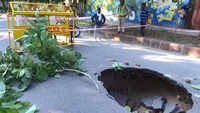
NEW DELHI: With metro operations allowed as part of the central government’s Unlock 4.0 guidelines from September 7, Delhi Metro, the country’s biggest and busiest metro network is all geared up to reopen on the 170th day since it shut down.
Safe travel: DMRC to take slew of measures
“As per the latest guidelines issued by the Ministry of Home Affairs under Unlock-4, the Delhi Metro will be resuming its services for public from 7th September 2020 onwards in a calibrated manner,” said Anuj Dayal, executive director (corporate communications), DMRC. “Further details on the Metro functioning and its usage by the general public will be shared once the detailed SOP on Metros is issued by the Ministry of Housing and Urban Affairs (MoHUA) in the next few days,” he said.
“I am glad that metro has been permitted to start its operations from 7 Sep in a phased manner,” Delhi chief minister Arvind Kejriwal tweeted on Saturday. Kejriwal had recently urged the centre to allow metro operations to resume, albeit in a graded manner.
While Delhi Metro will reopen after more than five months, a metro ride is not going to be the same anymore. While DMRC sources said that it is likely that initially, only government and PSU employees or those engaged in essential services are allowed at peak hours and train operation timings are also likely to be curtailed. According to sources, DMRC and other metros in the country have been asked to discuss a SOP earlier provided by MoHUA in a video conference on Tuesday and give their suggestions.
The number of commuters in trains would be drastically slashed to ensure social distancing, which is going to be the prime focus of DMRC and the Central Industrial Security Force (CISF), responsible for providing security in the Delhi metro, when services resume. Trains would also stop for longer durations at platforms to ensure passengers board and de-boarding while maintaining social distancing, which would result in longer travel time.
Only one entrance at most of the 242 metro stations would be kept open, keeping in mind which entry point sees the highest rush. Extensive ‘filtration’ of commuters through thermal scanning and regulation to avoid crowding inside the station would be carried out at the entrance and inside, both DMRC and CISF would largely keep a check through CCTV cameras.
DMRC officials said that the reopening would be challenging and there would be teething troubles initially and along with enforcement, it will also carry out an extensive ‘sensitisation’ campaign for commuters to encourage self-regulation. DMRC has deputed 487 officers on special duty on two shifts at all stations just to keep a check on social distancing but in case of major defiance of norms, entry to stations would be closed and a train might come to a halt too.
A senior CISF official said that extra personnel might be used in the CCTV control rooms to keep a tab on people not maintaining social distancing or not wearing masks inside the station premises. In addition to keeping a check on security, CISF’s quick reaction teams (QRTs) are also likely to travel in the metro in order to enforce social distancing inside the train, officials said.
“We are still awaiting the exact guidelines, but the CISF is prepared to enforce them and we have been preparing for this for the last few months. The CCTV room will be alerting teams on the ground about people that are not wearing masks or not following the rules. Our teams would travel in the metro earlier as well, but this time their focus will be to ensure people are maintaining distance and following the new guidelines,” said a senior CISF official, stating offenders will be handed over to the DMRC for penal action.
In Video:Delhi Metro to resume services from September 7 in calibrated manner
Safe travel: DMRC to take slew of measures
“As per the latest guidelines issued by the Ministry of Home Affairs under Unlock-4, the Delhi Metro will be resuming its services for public from 7th September 2020 onwards in a calibrated manner,” said Anuj Dayal, executive director (corporate communications), DMRC. “Further details on the Metro functioning and its usage by the general public will be shared once the detailed SOP on Metros is issued by the Ministry of Housing and Urban Affairs (MoHUA) in the next few days,” he said.
“I am glad that metro has been permitted to start its operations from 7 Sep in a phased manner,” Delhi chief minister Arvind Kejriwal tweeted on Saturday. Kejriwal had recently urged the centre to allow metro operations to resume, albeit in a graded manner.
I am glad that metro has been permitted to start its operations from 7 Sep in a phased manner.
— Arvind Kejriwal (@ArvindKejriwal) 1598712040000While Delhi Metro will reopen after more than five months, a metro ride is not going to be the same anymore. While DMRC sources said that it is likely that initially, only government and PSU employees or those engaged in essential services are allowed at peak hours and train operation timings are also likely to be curtailed. According to sources, DMRC and other metros in the country have been asked to discuss a SOP earlier provided by MoHUA in a video conference on Tuesday and give their suggestions.
As per the latest guidelines, Delhi Metro will be resuming its services for public from 7 September 2020 onwards in… https://t.co/kBxhPjaLKq
— Delhi Metro Rail Corporation (@OfficialDMRC) 1598713411000The number of commuters in trains would be drastically slashed to ensure social distancing, which is going to be the prime focus of DMRC and the Central Industrial Security Force (CISF), responsible for providing security in the Delhi metro, when services resume. Trains would also stop for longer durations at platforms to ensure passengers board and de-boarding while maintaining social distancing, which would result in longer travel time.
Only one entrance at most of the 242 metro stations would be kept open, keeping in mind which entry point sees the highest rush. Extensive ‘filtration’ of commuters through thermal scanning and regulation to avoid crowding inside the station would be carried out at the entrance and inside, both DMRC and CISF would largely keep a check through CCTV cameras.
DMRC officials said that the reopening would be challenging and there would be teething troubles initially and along with enforcement, it will also carry out an extensive ‘sensitisation’ campaign for commuters to encourage self-regulation. DMRC has deputed 487 officers on special duty on two shifts at all stations just to keep a check on social distancing but in case of major defiance of norms, entry to stations would be closed and a train might come to a halt too.
A senior CISF official said that extra personnel might be used in the CCTV control rooms to keep a tab on people not maintaining social distancing or not wearing masks inside the station premises. In addition to keeping a check on security, CISF’s quick reaction teams (QRTs) are also likely to travel in the metro in order to enforce social distancing inside the train, officials said.
“We are still awaiting the exact guidelines, but the CISF is prepared to enforce them and we have been preparing for this for the last few months. The CCTV room will be alerting teams on the ground about people that are not wearing masks or not following the rules. Our teams would travel in the metro earlier as well, but this time their focus will be to ensure people are maintaining distance and following the new guidelines,” said a senior CISF official, stating offenders will be handed over to the DMRC for penal action.
In Video:Delhi Metro to resume services from September 7 in calibrated manner

Coronavirus outbreak
Trending Topics
LATEST VIDEOS
City
 Shocking: 42-year-old Covid-19 patient allegedly jumps to death from hospital building in UP's Moradabad
Shocking: 42-year-old Covid-19 patient allegedly jumps to death from hospital building in UP's Moradabad  On cam: Car washed away in flash flood near Shakumbhari Devi Temple in UP's Saharanpur
On cam: Car washed away in flash flood near Shakumbhari Devi Temple in UP's Saharanpur  Shocking: Ex-jawan creates scare by opening fire in Hyderabad, arrested
Shocking: Ex-jawan creates scare by opening fire in Hyderabad, arrested  West Bengal: People use boat to commute in a flooded locality in Midnapore
West Bengal: People use boat to commute in a flooded locality in Midnapore
More from TOI
Navbharat Times
Featured Today in Travel
Get the app





